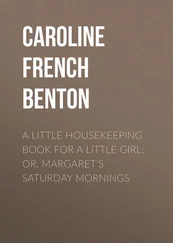Amanda Douglas - A Little Girl in Old St. Louis
Здесь есть возможность читать онлайн «Amanda Douglas - A Little Girl in Old St. Louis» — ознакомительный отрывок электронной книги совершенно бесплатно, а после прочтения отрывка купить полную версию. В некоторых случаях можно слушать аудио, скачать через торрент в формате fb2 и присутствует краткое содержание. Жанр: foreign_prose, на английском языке. Описание произведения, (предисловие) а так же отзывы посетителей доступны на портале библиотеки ЛибКат.
- Название:A Little Girl in Old St. Louis
- Автор:
- Жанр:
- Год:неизвестен
- ISBN:нет данных
- Рейтинг книги:4 / 5. Голосов: 1
-
Избранное:Добавить в избранное
- Отзывы:
-
Ваша оценка:
- 80
- 1
- 2
- 3
- 4
- 5
A Little Girl in Old St. Louis: краткое содержание, описание и аннотация
Предлагаем к чтению аннотацию, описание, краткое содержание или предисловие (зависит от того, что написал сам автор книги «A Little Girl in Old St. Louis»). Если вы не нашли необходимую информацию о книге — напишите в комментариях, мы постараемся отыскать её.
A Little Girl in Old St. Louis — читать онлайн ознакомительный отрывок
Ниже представлен текст книги, разбитый по страницам. Система сохранения места последней прочитанной страницы, позволяет с удобством читать онлайн бесплатно книгу «A Little Girl in Old St. Louis», без необходимости каждый раз заново искать на чём Вы остановились. Поставьте закладку, и сможете в любой момент перейти на страницу, на которой закончили чтение.
Интервал:
Закладка:
“Come in, come in!” he cried cheerily. “There is no one to buy you up, like a bale of merchandise.”
“But – you wouldn’t sell me?” Her eyes had a laughing light in them, her voice a make-believe entreaty, and altogether she looked enchanting.
“Well, it would take a great deal of something to buy you. It would have to be more valuable than money. I don’t care so much for money myself.”
He put his arm about her and hugged her up close. He was sitting at a massive old desk that he had bought with the place. It seemed crowded full of various articles.
“But you love me better than any one else?”
“Any one else? Does that mean ever so many people love you? The Renaud children, and Ma’m’selle Barbe, and – perhaps – your grandfather?”
“Oh, you know I don’t mean that!” Her cheek flushed with a dainty bit of vexation. “The others like me well enough, but you – how much do you love me?”
“The best of any one. Child, I do not think you will ever understand how dear you are to me. There is no measurement for such love.”
That was the confession she wanted. Her face was radiant with delight – a child’s pleasure in the present satisfaction.
She glanced around. “Do you mean to sell all these things?” she asked wonderingly.
“Oh, yes and many more. I ought to be down on the Rue Royale, where people could find me easily. But I took a fancy to this old place, and the man was in my debt; so he paid me with it. It would not be so pleasant to live down there, on the lower side, by the levee. But I shall stay here and wait till the people come to me. After all, for a few years, if we get enough to eat and a little to wear, it will suffice.”
“And what then?” with captivating eagerness.
“Why, then – ” he hesitated. Why should he think of this just now? He did not want her grown up into a charming mademoiselle, even if she resembled her mother still more strongly.
“Yes; what then? Isn’t it just the same afterward, or do people come to a time when they stop eating?” and a gleam of mischief crossed her face.
“That is at the end of life, child – sixty or eighty years.”
“No, I don’t mean that time,” with a shrug and a little curl of the lip. “Maybe – after a few years – ”
“Well?” in amused inquiry.
“You might go to New Orleans and take me. Ma’m’selle Barbe has been, and she says it is so beautiful and gay.”
“And you have been half over the world. Ma’m’selle has not been to Quebec nor Detroit.”
“Oh, that is true enough,” laughingly. “Nor to France.”
Two customers paused at the door, and he said, “Run away, dear.” So she went obediently, watched Mère Lunde at her work awhile, then strolled out to the garden spot, where two hired slaves were working. What should make them so different from white people? Where was Africa and the Guinea Coast that she heard spoken of at the Renauds’? Their lips were so thick and red and their hair so woolly. But they seemed very merry, though she could not understand a word they said; it was a queer patois.
Uncle Gaspard came out presently. “Wouldn’t you like to have a flower garden?” he asked.
“What is here?” She put out her small moccasined toe toward a rather stiff-looking plot of green plants.
“Oh, that is Mère Lunde’s garden of herbs. All manner of things for potage, and the making of sundry remedies in which she has great faith. She will look after that.”
“And must I look after mine?”
“I will come and help you.”
“Oh, then, I will have a garden!” she cried joyfully.
CHAPTER IV – THE SOWING OF A THORN
It was only a short distance to the priest’s house, where the classes met. She ran off by herself. There was quite a throng of girls, though, as with most of the early Western settlers, education was not esteemed the one thing needful for girls. To make good wives was the greatest attainment they could achieve. Still, Father Lemoine labored with perseverance at the tillage of their brains on the two afternoons, and the tillage of their souls on Saturday.
After the two hours were over the restless children had a run up to the Fort. The Guions there were Madame Renaud’s relatives. There was a great thicket of roses that covered the line of palings, and some ladies were having refreshments under a sort of arbor, little cakes and glasses of wine much diluted with water.
“Oh, yes, come in,” exclaimed Sophie as Renée hung back. “You have been here before, you needn’t feel strange.”
That was true enough. Then she had been Sophie’s guest. Now she had a curious hesitation.
Elise was going around courtesying to the ladies, and answering their inquiries. Sophie stooped to play with the cat. An old lady nearest Renée handed her a plate of small spiced cakes.
“You have gone to Monsieur Denys,” she said in a soft tone. “He is – ” raising her eyes in inquiry.
“He is my uncle.” Renée made a graceful little courtesy as she said this, and thanked the lady for the cake.
“I suppose M. Denys means to settle down now,” said another. “It is high time. He ought to marry. There is nothing like a good wife.”
“That will come along,” and another nodded with a mysterious but merry smile. “That is why he is smartening up so. And he has brought some elegant stuffs from Canada to dress her in when he gets her. Madame Aubrey was in yesterday and bought of him a gown for Genevieve. He was showing her some finery that would adorn a bride. I think we shall hear before long.”
They all nodded and glanced sidewise from Elise to Sophie as if they might have something to do with it.
“I must go,” exclaimed Renée, her face flushing.
“No, wait, I am not ready,” said Sophie.
But Renée courtesied to them all and flashed through the rose-hung entrance. She ran swiftly down the street, turned the corner to her own home, and entered the gate. Mère Lunde sat at the doorway knitting.
“Where is Uncle Gaspard?” she cried breathlessly.
“In the shop chaffering. They have found him out, you see, and I hope the good Father of all will send him prosperity,” crossing herself devoutly.
Renée dropped down on the doorstep. Her child’s heart was in a tumult. Had not the house been planned for her, and the pretty room made especially? Where would he put a wife? His small place in the corner of the shop, hung about with curtains, was not fit, since the wife would be Ma’m’selle Barbe, whose pretty white bed had fringed hangings that she had learned to knot while she was in New Orleans.
“Why do you sigh so, little one?”
Renée could not contain her anxiety.
“O ma mère, do you think Uncle Gaspard will marry?” she cried with passionate vehemence. “Will he bring a wife here to live with us?”
“What has put such a thing in thy head, child? Surely the good priest would not venture to suggest that to thee!”
“It was in the Guions’ garden. I went there with the girls. And some one said he had fixed the house for that, and they smiled and I knew who they meant.”
She wiped some tears from her hot cheek.
“Who was it?” the dame asked simply.
“Who should it be but Ma’m’selle Barbe! Oh, I could guess who they thought would come.”
“Ma’m’selle is a pretty girl and sweet tempered. She has a dot, too,” said the placid woman. “But then I think – ”
Renée burst into a passion of tears, and springing up stamped on the ground.
“She shall not come here!” she cried vehemently. “She shall not have Uncle Gaspard! Oh, why did he go clear to Canada for me, why did he bring me here?”
“There was your gran’père – ”
Читать дальшеИнтервал:
Закладка:
Похожие книги на «A Little Girl in Old St. Louis»
Представляем Вашему вниманию похожие книги на «A Little Girl in Old St. Louis» списком для выбора. Мы отобрали схожую по названию и смыслу литературу в надежде предоставить читателям больше вариантов отыскать новые, интересные, ещё непрочитанные произведения.
Обсуждение, отзывы о книге «A Little Girl in Old St. Louis» и просто собственные мнения читателей. Оставьте ваши комментарии, напишите, что Вы думаете о произведении, его смысле или главных героях. Укажите что конкретно понравилось, а что нет, и почему Вы так считаете.












